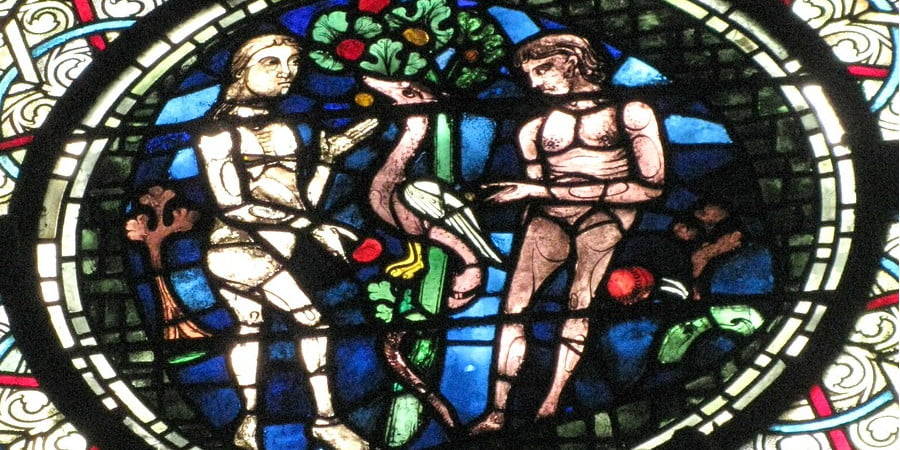The Bible’s creation stories are key texts in shaping Christian views of gender and sexuality. To some they represent a manifesto for the equality of men and women across all areas of life, while for others they speak of a creation order in which men and women share equal worth but leadership belongs to men.
It is typically assumed that because the Genesis texts describe the world prior to the impacts of human sin, that whatever is found within them can be taken to represent life as it should be, and is therefore, normative for humankind. This assumption needs to be challenged. If it were true we would declare it sinful for any fertile adult to be single, for the command of God to “be fruitful and multiply” must be normative for everyone. Likewise, every city-slicker among us would abandon our jobs and become farmers, for this is the mode of work, indeed the only mode of work, envisaged in Genesis 2-3, and must be normative for all.
The creation narratives were not written in an a-cultural or a-historical era. They were composed by people living in ancient times in societies that had their own cultural, linguistic, economic and political systems. They had no option but to construct narratives that made sense against that background. Given that patriarchy was one of the most enduring and embedded of social systems across the ancient Mediterranean, it is natural that stories involving men and women would draw upon the thought forms and practises of patriarchy.
Patriarchal overtones are, arguably, absent from Genesis 1, but are woven throughout the Garden story (and indeed through the rest of the Bible). It is the man who is created first and the woman created in relation to him rather than he to her; it is the man to whom God gives the command not to eat of the tree of knowledge; it is the man whom God calls when the man and woman were hiding.
Does this mean the Garden story endorses patriarchy? No it does not. The issue is not whether the story employs patriarchal modes of thinking but whether it is the point of the story to make an argument of some kind in that direction. We need to distinguish between details that are incidental to the telling of a story and the point the story is seeking to make. Think of Jesus’s story of the Good Samaritan, which pictured a man travelling the road between Jericho and Jerusalem, beaten by robbers, and left by the side of the road to die. The specifics of the story are incidental to the point Jesus wished to make. He could have set the scene on a different road, or had robbers beating a man in his house. He could have told a story in which the victims were a husband and wife, or three travelling companions. The priest and the Levite who leave the man dying by the side of the road could have been a Pharisee and a Sadducee. The Samaritan could have been a Roman soldier. These things are the background detail of the story. The meaning of the story is found by attention to the plot, the way it progresses and joins the dots together.
Similarly, when we turn to Genesis 2-3 we must avoid drawing significance from the background details of the story and instead focus on the ways the storyline is formed, characters developed and connections drawn. This is more art than science, and there will always be room for debate, but at least leaves us with a starting point.
Genesis 1, with its seven day structure building to the creation of humankind in God’s image on day six and the rest of God on day seven, establishes that the universe is the handiwork of a single, good and unrivalled God; that God has imbued creation with abundant, rich and diverse forms of life; and that humankind is granted a unique vocation and a unique status. The message that human beings are created in God’s image and likeness was nothing short of revolutionary. In a world where kings alone were described as the image and representative of their gods, Genesis 1 was a game-changer. If all are created in the image of God all must be treated with dignity and respect; all must be given access to the sufficiency of the earth; all must be granted opportunity to share in the governance of creation. Moreover Genesis 1 makes it clear that men and women alike bear the image and that men and women alike were given the commanded to fill the earth and to rule it.
For millennia we did our best to undo this. Jewish and Christian literature is filled with tortuous attempts to demonstrate that women are not really created in God’s image, or if they are, that they are so in a lesser way. And while we are thankfully rid of this notion today, women who embrace the glorious, liberating and downright audacious declaration of Genesis 1 that both women and men are created in God’s image, both commissioned to multiply and fill the earth and both commissioned to rule and subdue the earth, too often find that by the time the preacher is done with Genesis 2 the women are left responsible for the multiplying and the men for the ruling and subduing.
So what about Genesis 2-3? What is the Garden story trying to say? I think the structure and storyline allow us to say three things. First, the Garden story is one of a complex of four stories (the others being the Cain-Abel story, the flood story, and story of the Tower of Babel) that share a common pattern. In each story human beings are seduced by the desire to be gods/godlike. They turn away from their Creator and against each other. In each story God responds by exiling people from the places they belonged (Adam and Eve exiled from the Garden; Cain exiled from farmland; humanity from the earth; and the tower builders from the Plain of Shinar). God also creates a window of hope that humanity might continue, or even be restored. And so the four stories lead us to Genesis 12, the call of Abraham and promise that through him and his descendants all the families of the earth will be blessed.
A second way in is to look at the beginning and the ending of the Garden story and what occurs in between and to ask how these are connected. Genesis 2 begins with a world that is not yet able to sustain life, due to the absence of rain to water the ground and people to till the land. This is not the world in which humanity was to live. The man and woman are rather located in an oasis like garden. It is filled with trees that were pleasing to the eye and good for food, and would remain that way as it had rivers that kept it watered and people to till the land. As the humans fulfil the command of Genesis 1 to multiply and fill the earth their tilling will presumably be matched with God sending rain and the garden will be extended outwards until it covers the earth, a global community enjoying the loving presence of a good and generous God whom they worship; with good, just and generous relationships with others; and who ensure the earth remains productive not only for humankind but for all God’s creatures.
Yet the story ends very differently. The woman and the man are seduced by the promise they can not only reflect God but be gods. They turn away from God and on each other before being expelled from the garden into the less-than-productive world. Yet they learned that even here God still loved them, provided for them, and held out the hope that humanity might one day live inside the garden again.
The meaning of the story trough this frame is to let us understand why we live “outside the garden” and to be restored to God.
A third frame of reference is suggested by striking or unusual movements in the text, such as the statement that “It is not good for the man to be alone.” In view of the constant “It is good” refrain through Genesis 1, “it is not good” screams “pay attention this”. Something significant is signalled. The man had been given but one task – to till and keep the earth – so it is presumably this for which he needed help. This is, I assume, an application of the commission to rule and subdue the earth found in Genesis 1. The man cannot complete the task on his own.
What type of helper does he need? The story soon makes this clear. God brings the animals to the man, who in the process of naming them is able to discern if any will be a suitable help. None can be found. God therefore takes part of the man and fashions a helper, a woman, from it. The man is overjoyed. “Here at last! Flesh of my flesh and bone of my bones.” What type of helper does the man need? Another human, someone who, unlike the animals is just like him.
[Inexplicably to me many Complementarians and those who see homosexuality as inherently incompatible with godliness commonly argue that the point of the creation of the woman from the man is that she is a sexual other. How one decides the point of the text is the difference between the man and the women when the plot structure focuses so strongly on their commonality baffles me]
The story concludes that “for this reason” men and women form marriages, new kinship units (which according to Gordon Wenham is what “becoming one flesh” most likely refers to). In our era we usually marry because we see in our partner someone with whom we can enjoy emotional intimacy and companionship. As valid as this may be it is not the reason for marriage given in Genesis 2. Here marriage is forged out of a recognition that we cannot fulfil God’s mandate to steward the earth on our own. If the point seems a little abstract, remember that when Genesis was composed Israel was a nation of small-scale farmers in which husband, wife and other family members toiled together to nurture the productivity of the earth. The argument of this story spoke directly to their circumstance.
These are the directions the story suggests to us. It is so tempting to harness it for our own purposes, for the egalitarian to discern egalitarian patterns as surely as the Complementarian discerns complementation patterns. I just can’t see that any of these are suggested by the text. Yes, one could read the description of Eve as “helper” to indicate Adam was to lead and Eve to follow, but this is neither required (is a teacher who helps a student learn thereby renders subordinate to the student?) and I cannot see any way this idea is taken up or developed within the story. It seems to me the stories simply aren’t interested in the questions we are bringing.
If the history of interpretation teaches us anything, it is that we ought to be very circumspect in how we use biblical stories. Once we shift from identifying their meaning via plot structure, textual interplays and character development we are cast adrift into a world where we can read any and every idea we might possibly like into the text. Those who have gone before us, including some of our greatest scholars and leaders, have neglected this and found in the creation stories the “clear teaching of God” that women are not created in God’s image, or are an inferior version of it; that women are less spiritually and morally reliable than men; that women are less intelligent than men; that it is women who are the destroyers of mankind; and more.
A final note
No doubt some will argue that they are taking their interpretive cues from 1 Corinthians 11 and 1 Timothy 2. The meaning of these texts and what is meant by reference to the order of creation of Adam and Eve is highly contested. It is a brave person who suggests they have any certainty as to what those texts tell us about the indicators of meaning in the creation stories., But this post is already very long and this question will need to be discussed at another times








Also strongly recommend John Walton’s writing on the first chapters of Genesis. He opens your eyes wide open to interpretation and cultural context of writing.
Thanks Scott for your contribution to the discussion.
Thanks Sarah, I too have found Walton’s writing helpful
Thanks as ever Scott for your reasoning on Genesis 1 and 2.
Thanks Amanda.
Hi Scott. I have been following your blog for quite a while now. I find it thought provoking, sometimes challenging and sometimes very affirming. I just thought it was about time to say that although I don’t enter into the theological discussions I do really appreciate the time and care that you put into your writing. And sometimes when my faith has been shaky I have heard God’s voice in your words which has been life and faith affirming. So thank you!
Thanks Linda. Really glad you have found the blog useful!